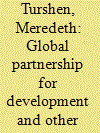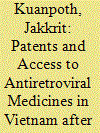| Srl | Item |
| 1 |
ID:
094995


|
|
|
|
|
| Publication |
2010.
|
| Summary/Abstract |
The implementation of the Agreement on Trade-Related Aspects of Intellectual Property Rights (TRIPS Agreement) in Egypt raised concerns over public health implications, resulting from pharmaceutical patents, especially because the Egyptian pharmaceutical industry is heavily dependent on generic production. The current level of global competition in the pharmaceutical market, together with the lack of local pharmaceutical research, threaten the industry, and, as a result, access to affordable medication is expected to be impaired. Determinants of access to medicines are analysed. An epidemiological overview of the most prevalent diseases in Egypt has been done in light of the results of surveys about changes in medicine prices and availability, to speculate about potential limitations in access to medicines. Considering domestic pharmaceutical pricing and marketing regulations, which are mainly concerned with affordability, together with the flexibilities in the TRIPS Agreement, short-term solutions to potential access problems will be possible. Egypt has the necessary theoretical safeguards against negative implications of the TRIPS Agreement on access to treatment. However, this does not necessarily mean that these safeguards will be implemented in a way that will protect against the implications of patent protection on medicines in the long term.
|
|
|
|
|
|
|
|
|
|
|
|
|
|
|
|
| 2 |
ID:
158669


|
|
|
|
|
| Summary/Abstract |
In international relations, globalization transfers the location of governance from nation-states laterally to such private actors as nongovernmental organizations (NGOs) and multinational firms, as well as vertically to local governments and supranational organizations. The purpose of this article is to clarify how the competitions among firms affect the problem of global issues by examining the case of the Trade-Related Aspects of Intellectual Property Rights (TRIPS) and public health. This study shows why most of least developed countries implemented the TRIPS despite the warning of NGOs not to implement earlier for the sake of access to medicines. In order to understand the positive attitude of least developed countries toward the TRIPS, we have to examine how the distribution of pharmaceutical firms capacities in developing countries affect the implementation of the TRIPS Agreement. The existence and different capacities of generic pharmaceutical companies in developing companies are important elements of state policy toward the TRIPS.
|
|
|
|
|
|
|
|
|
|
|
|
|
|
|
|
| 3 |
ID:
131350


|
|
|
|
|
| Publication |
2014.
|
| Summary/Abstract |
This article revisits the United Nations Millennium Development Goals (mdgs) set in 2000, timely now because policy makers are currently making plans for the period after 2015. After laying out a critical analysis of the mdgs, the article focuses on Millennium Goal 8, the global partnership for development. The argument made is that the absence of any goal to reset the asymmetrical power relations between the North and the South reveals the limitations of the endeavour. The pharmaceutical industry is discussed in detail because mdg8/Target 6 deals with access to affordable, essential drugs in developing countries. This target seems emblematic of a problem found throughout the millennium project: the unaddressed need for real economic development. Target 6 exemplifies both North-South and public-private conflicts of interest, which are carefully hidden in official documents behind the euphemism of 'partnership', as if countries of such unequal power could be partners.
|
|
|
|
|
|
|
|
|
|
|
|
|
|
|
|
| 4 |
ID:
078887


|
|
|
| 5 |
ID:
095582


|
|
|
|
|
| Publication |
2010.
|
| Summary/Abstract |
Increasing access to essential medicines has become an international priority, given the rapid spread of intractable diseases such as HIV/AIDS, tuberculosis and malaria. It follows that the quests to improve the global quality of healthcare and achieve health equity present a challenge for many countries, especially those that have been hard hit by deadly pandemics and whose populations are also still without essential drugs. Consequently, many countries have stepped up efforts to remove the obstacles to the availability and affordability of essential medicines. The Agreement on Trade-Related Aspects of Intellectual Property Rights (TRIPS) contains flexibilities that can be used as tools for enhancing access to cheap medicines and for controlling drug pricing. However, these flexibilities are not necessarily a panacea and cannot singly solve the problem of limited access to essential medicines. Put differently, cheaper medicines cannot reach the poor without the infrastructure to deliver them. For this to become a reality, commitment on the part of the member countries to adopt comprehensive and cooperative measures to tackle the burdensome barriers that limit access to critical medicines is needed. It is only then that the flexibilities in TRIPS can be optimized and a real difference made in the lives of poor patients across the developing world.
|
|
|
|
|
|
|
|
|
|
|
|
|
|
|
|